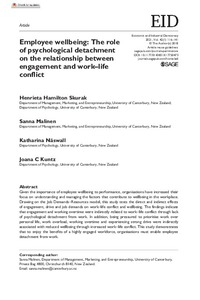Employee wellbeing: The role of psychological detachment on the relationship between engagement and work–life conflict

Hamilton Skurak, Henrieta ; Malinen, Sanna ; Näswall, Katharina ; Kuntz, Joana C.
Economic and Industrial Democracy
2021
42
1
February
116-141
well being ; work-life balance
Social sciences
https://doi.org/10.1177/0143831X17750473
English
Bibliogr.
"Given the importance of employee wellbeing to performance, organisations have increased their focus on understanding and managing the factors that contribute to wellbeing in the workplace. Drawing on the Job Demands–Resources model, this study tests the direct and indirect effects of engagement, drive and job demands on work–life conflict and wellbeing. The findings indicate that engagement and working overtime were indirectly related to work–life conflict through lack of psychological detachment from work. In addition, being pressured to prioritise work over personal life, work overload, working overtime and experiencing strong drive were indirectly associated with reduced wellbeing through increased work–life conflict. This study demonstrates that to enjoy the benefits of a highly engaged workforce, organisations must enable employee detachment from work."
Digital
The ETUI is co-funded by the European Union. Views and opinions expressed are however those of the author(s) only and do not necessarily reflect those of the European Union or the ETUI.